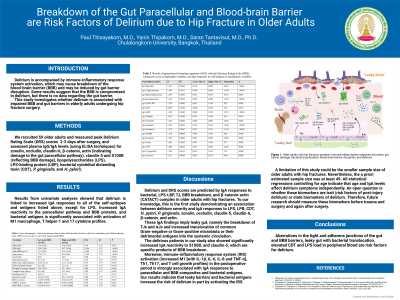Neurocognitive Disorders, Delirium, and Neuropsychiatry
Session: Poster Session
(099) Breakdown of the Gut Paracellular and Blood-brain Barrier and Disorders in the β-Catenin-Actin Complex are Risk Factors of Delirium due to Hip Fracture in Older Adults

Trainee Involvement: No
- PT
Paul Thisayakorn, MD
Assistant Professor
Department of Psychiatry, Faculty of Medicine, Chulalongkorn University
Bangkok, Krung Thep, Thailand 
Yanin Thipakorn, MD
Psychiatrist
King Chulalongkorn Memorial Hospital, Krung Thep, Thailand- ST
Saran Tantavisut, MD, PhD
Associate Professor
Department of orthopedics, Faculty of Medicine, Chulalongkorn University
Bangkok, Krung Thep, Thailand
Presenting Author(s)
Co-Author(s)
Background: Delirium is accompanied by immune-inflammatory response system (IRS) activation. This study examines whether delirium and IRS activation in older hip fracture surgery adults are associated with aberrations in the gut and blood brain barrier (BBB) and increased translocation of bacterial antigens. Methods: We recruited 59 older adults and measured, 2-3 days after surgery, peak Delirium Rating Scale (DRS) scores and IgA and IgG antibody levels directed to the paracellular pathway (zonulin, occludin, claudin-6, β-catenin, actin), BBB (claudin-5, S100B), bacterial-associated antigens (lipopolysaccharides [LPS], LPS-binding protein [LBP]; bacterial cytolethal distending toxin [CDT]), Porphyromonas gingivalis, and Helicobacter pylori. Results: Delirium and DRS scores are correlated with the IgA responses directed to the paracellular pathway, BBB, and bacterial antigens. Part of the variance in peak DRS scores 2-3 days after surgery was explained by IgA directed to LPS and LBP (45.0%) or bacterial CDT (48.3%), basal DRS, and previous stroke. IRS activation (a composite denoting M1 macrophages and T helper cells) is strongly associated with IgA reactivity to paracellular, BBB, bacterial, and LPS-associated antigens and additionally to IgG reactivity to paracellular antigens and LPS; 43.2% of the variance in the IRS index is associated with IgA to claudin-6, occludin, and zonulin, IgG to PBS and LBP, age, and previous stroke. Conclusions: Aberrations in the tight and adherens junctions of the gut and BBB barriers, leaky gut with bacterial translocation and elevated LPS and CDT load in blood, and disorders in the Wnt/β-catenin pathway are risk factors for delirium. 2. Wu J, Yin Y, Jin M, Li B. The risk factors for postoperative delirium in adult patients after hip fracture surgery: a systematic review and meta-analysis. International journal of geriatric psychiatry. 2021;36(1):3-14.
References:
1. Yang Y, Zhao X, Gao L, Wang Y, Wang J. Incidence and associated factors of delirium after orthopedic surgery in elderly patients: a systematic review and meta-analysis. Aging clinical and experimental research. 2020.

